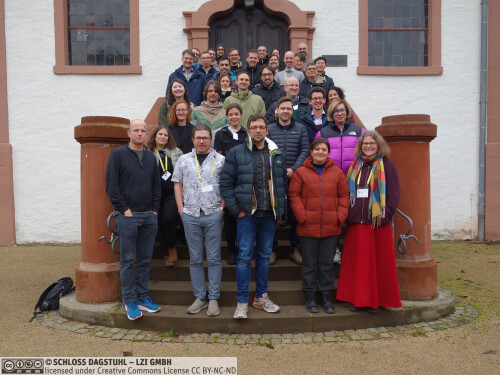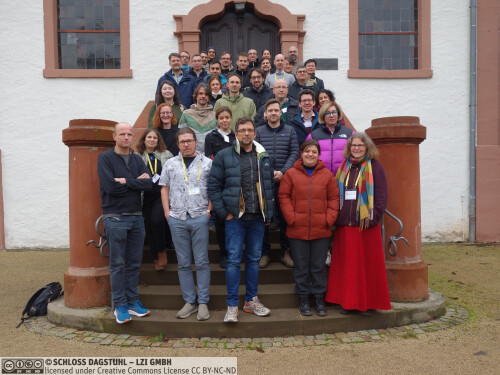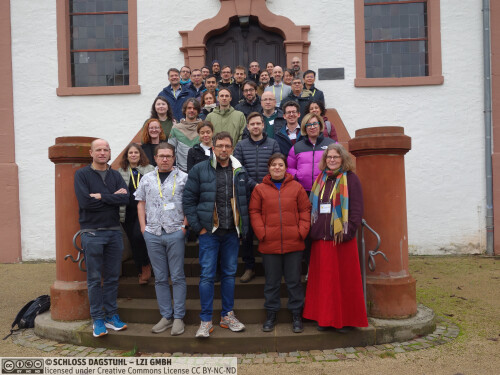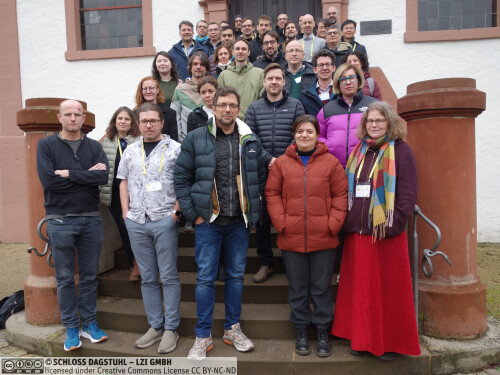Dagstuhl-Seminar 24491
Deep Learning for RNA Regulation and Multidimensional Transcriptomics
( 01. Dec – 06. Dec, 2024 )
Permalink
Organisatoren
- Annalisa Marsico (Helmholtz Zentrum München, DE)
- Uwe Ohler (Max-Delbrück-Centrum - Berlin, DE)
- Igor Ulitsky (Weizmann Institute - Rehovot, IL)
- Gene Yeo (University of California - San Diego, US)
- Kathi Zarnack (Universität Würzburg, DE)
Kontakt
- Marsha Kleinbauer (für wissenschaftliche Fragen)
- Christina Schwarz (für administrative Fragen)
Gemeinsame Dokumente
- Dagstuhl Materials Page (Use personal credentials as created in DOOR to log in)
Programm
At the Dagstuhl Seminar on RNA Regulation and Multidimensional Transcriptomics, we will delve into the intersection of computational biology, deep learning, and RNA research. The event will explore how cutting-edge AI technologies are reshaping our understanding of RNA-based gene regulation and its role in health and disease.
Genomics is poised to become one of the most data-intensive domains in biology and medicine in the coming decade. This influx of data ushers in both opportunities and challenges for the fields of machine learning and computational biology. As we strive to uncover meaningful patterns and actionable insights from this wealth of information, traditional machine learning approaches, which rely on handcrafted features, reveal their limitations. In contrast, deep learning models exhibit the capacity to autonomously derive increasingly complex features directly from the data itself. This attribute has propelled their success in domains such as computer vision, speech recognition, and machine translation. In recent years, these innovations have begun to transform the field of protein structure predictions and are steadily finding applications in genomics, particularly in the study of DNA and RNA regulation.
Living organisms must continually regulate gene expression to adapt to changing environments and respond to stress. RNA molecules have emerged as pivotal players in these regulatory functions. This includes a diverse array of RNA types, from small ~22 nucleotides long RNAs to much larger long noncoding RNAs, whose mechanisms are still not completely understood. Recent advancements in next-generation sequencing and high-throughput technologies have enabled us to explore both coding and noncoding RNAs at an unprecedented level of detail. International consortia have amassed experimental and patient data, but the sheer complexity and volume of biomedical datasets necessitate advanced computational tools to distil meaningful insights. Deep learning strategies including convolutional and recurrent neural networks have emerged as the state-of-the-art models for transcriptomics, such as for predicting molecular targets, alternative splicing outcomes, translational efficiency, microRNA targets, and the impact of genetic variants. This Dagstuhl Seminar aims to discuss machine learning strategies for RNA regulation and multidimensional transcriptomics, bringing together AI specialists, computational biologists, and experimental researchers.
The event will focus on four key topics and their specific challenges:
- Emerging non-coding RNA functions
- Modelling RNA-regulatory processes
- The epitranscriptome as a hidden layer of RNA regulation
- Following RNAs in time and space
This seminar is committed to fostering a collaborative environment where researchers can exchange ideas, share the latest findings, and identify new research directions.
 Annalisa Marsico, Uwe Ohler, Igor Ulitsky, Gene Yeo, and Kathi Zarnack
Annalisa Marsico, Uwe Ohler, Igor Ulitsky, Gene Yeo, and Kathi Zarnack
Please log in to DOOR to see more details.
- Rolf Backofen (Universität Freiburg, DE) [dblp]
- Pavel Baranov (University College Cork, IE) [dblp]
- Mathieu Blanchette (McGill University - Montréal, CA) [dblp]
- Charlotte Capitanchik (The Francis Crick Institute - London, GB)
- Christoph Dieterich (Unviversitätsklinikum Heidelberg, DE) [dblp]
- Florian Erhard (Universität Regensburg, DE) [dblp]
- Eduardo Eyras (Australian National University - Canberra, AU) [dblp]
- Julien Gagneur (TU München - Garching, DE) [dblp]
- Jonathan Göke (Genome Institute of Singapore, SG) [dblp]
- Marko Jovanovic (Columbia University, US)
- Jan Philipp Junker (Max-Delbrück-Centrum - Berlin, DE)
- Julian König (Institut für Molekulare Biologie - Mainz, DE)
- Frederick Korbel (Max-Delbrück-Centrum - Berlin, DE)
- Claudia Kutter (Karolinska Institute - Stockholm, SE)
- Gioele La Manno (EPFL - Lausanne, CH)
- Markus Landthaler (Max-Delbrück-Centrum - Berlin, DE) [dblp]
- Liana Lareau (University of California - Berkeley, US) [dblp]
- Martin Lewinski (Universität Bielefeld, DE) [dblp]
- Mo Lotfollahi (Wellcome Sanger Institute - Cambridge, GB)
- Yael Mandel-Gutfreund (Technion - Haifa, IL) [dblp]
- Miguel Ángel Manzanares Serrano (Envisagenics - New York, US)
- Annalisa Marsico (Helmholtz Zentrum München, DE) [dblp]
- Jin-Wu Nam (Hanyang University - Seoul, KR) [dblp]
- Evgenia Ntini (FORTH - Heraklion, GR)
- Uwe Ohler (Max-Delbrück-Centrum - Berlin, DE) [dblp]
- Yaron Orenstein (Bar-Ilan University - Ramat-Gan, IL) [dblp]
- Michal Rabani (The Hebrew University of Jerusalem, IL) [dblp]
- Katie Rothamel (University of California - San Diego, US)
- Alexander Sasse (Unviversität Heidelberg, DE)
- Hagen Tilgner (Weill Cornell Medicine - New York, US) [dblp]
- Jernej Ule (UK Dementia Research Institute at King's - London, GB) [dblp]
- Igor Ulitsky (Weizmann Institute - Rehovot, IL) [dblp]
- Barbara Uszczynska-Ratajczak (Polish Academy of Sciences - Poznan, PL) [dblp]
- Li Yang (Fudan University - Shanghai, CN)
- Kathi Zarnack (Universität Würzburg, DE) [dblp]
- Jianyang Zeng (Westlake University - Hangzhou, CN) [dblp]
Verwandte Seminare
- Dagstuhl-Seminar 17252: Computational Challenges in RNA-Based Gene Regulation: Protein-RNA Recognition, Regulation and Prediction (2017-06-18 - 2017-06-21) (Details)
- Dagstuhl-Seminar 19342: Advances and Challenges in Protein-RNA Recognition, Regulation and Prediction (2019-08-18 - 2019-08-23) (Details)
Klassifikation
- Artificial Intelligence
- Machine Learning
- Other Computer Science
Schlagworte
- Deep Learning
- RNA
- Epitranscriptomics
- Single-cell transcriptomics





 Creative Commons BY 4.0
Creative Commons BY 4.0
